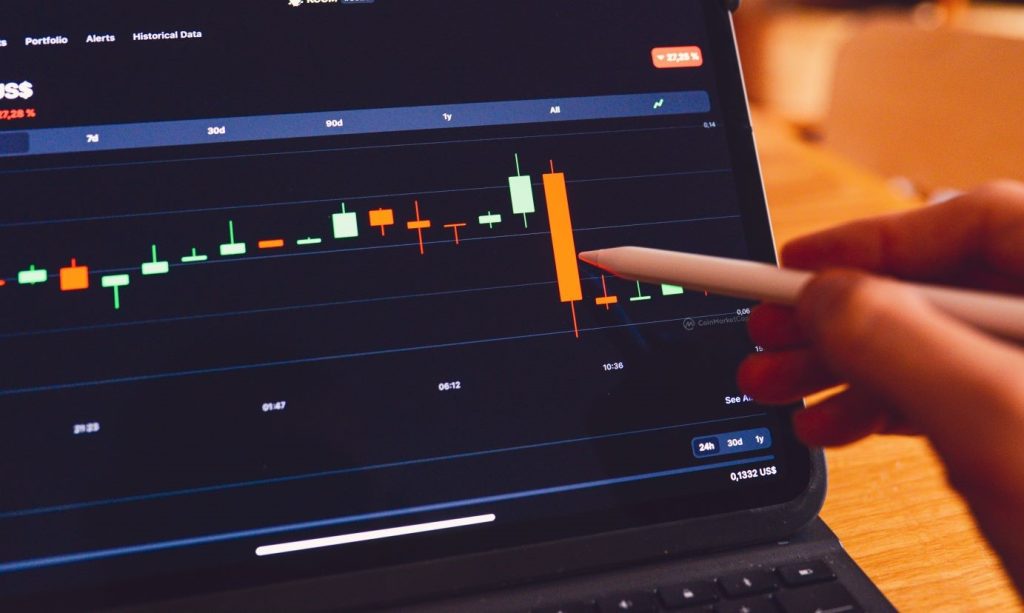Forex is one of the fastest moving financial instruments with a key aspect of this market being currency volatility, the degree to which the value of a currency fluctuates over time.
To be successful as a Forex trader, you must understand about the impact of currency volatility in Forex trading as it influences key areas from risk management to selecting the optimum trading strategies. By grasping the intricacies of volatility will mean the difference between gaining and losing on your trading account.
The aim of this Axcess FX article is too make you aware of the impact of currency volatility in Forex trading by identifying ten areas where you will encounter its effects; hitting home how it must not be ignored.
1. Risk Versus Reward in Volatile Forex Markets
Currency volatility is a classic double-edged sword in Forex trading. Volatile markets mean that currency prices can move dramatically in short time frames, offering the chance for substantial gains. Yet with these opportunities come increased risks as large price swings can just as easily lead to significant trading losses resulting in a loss of capital on your trading account.
Short term traders are particularly affected by volatility as sharp movements can leas to quick profits, yet without solid risk management strategies unpredictable swings can lead to losses.
Some currency pairs are more volatile than others with factors like liquidity impacting on price movement, particularly in non-major currency pairs. Examples of volatile currency pairs include:
- Emerging Market Currencies like USD/TRY (US Dollar/Turkish Lira) or USD/ZAR (US Dollar/South African Rand) are well known for their volatility.
Even major currency pairs like USD/JPY (US Dollar/ Japanese Yen) or EUR/USD (Euro/US Dollar) can experience volatility during economic announcements or geopolitical events and the impact of these fluctuations can be profound:
2. Trading Strategies for Differing Vol Levels
Varying trading strategies may be required for differing levels of market volatility from high down to low vol situations.
High volatility scenarios
Periods of high volatility will suit short term traders employing scalping or day trading strategies.
- Scalping involves making multiple trades over a short period to profit from small price changes and needs continuous market movement to be effective.
- Day Trading see traders open and close positions within a single trading day to capitalize on short-term price movements and needs volatility to be an effective strategy and not intraday prices.
Low volatility situations
Low volatility in the Forex markets is better suited to swing and position traders who are looking to hold positions longer term.
- Swing Trading targets locking in profits over a few days to a few weeks, with swing traders thriving in moderately volatile markets.
- Position Trading is the longest term strategy type and involves holding positions for weeks, months, or even years, well suited for markets with lower volatility.
For more information on Forex trading strategies, Investopedia have written a detailed resource which you can read here.
3. The Cost Implications Of Trading in Volatile Markets
Volatility in Forex trading not only affects the strategy, but also impacts on the cost of trading in the market due to the twin effects of spreads and slippage.
As volatility gets higher, typically Brokers will widen the spread (the difference between the bid and offer price in a Forex quote) which means entry and exit points for a trade become more expensive.
The likelihood of experiencing slippage, which is when an order is filled at a different price than expected also increases in volatile markets. Slippage directly affects your Profit and Loss account and we have written a useful article on slippage.
To minimize the costs associated with slippage and spreads, traders can take some preventative action including:
- Choosing the right broker: Some brokers offer more competitive spreads, even in volatile conditions. (link to our page Compare broker spreads here.)
- Trading during peak hours: Trading when liquidity is highest can reduce the cost impact of volatility.
4. Margin Requirements and Volatility
When you trade Forex, it is important to understand how your broker will adjust margin requirements in response to market volatility. Margin in forex, is the amount of capital needed to open and maintain a trading position.
Increased margin requirements
In volatile markets, brokers may increase the percentage of margin required to offset the risk of large price movements that may lead to losses exceeding a trader’s capital account balance. It means traders need to commit more capital to hold a position open. Capital allocation is also affected as the more capital tied up in margin means less capital available for other trades.
Impact on trading strategies
Higher margin requirements demanded by a broker can affect trading strategies too. Traders may have to reduce leverage that make strategies like day trading less viable, by limiting potential gains.
As a trader you should periodically check your broker’s margin policies and know when to adjust strategies accordingly. Understanding margin requirements is crucial for effective risk management in volatile Forex markets.
5. The Role of Stop-Loss Orders in Managing Vol
We cannot stress enough how vital stop-loss orders for managing Forex trading risk. They automatically close a position at a predetermined price level to limit potential losses. Yet, when currency markets are volatile, rapid price swings can still take out stop-loss levels, particularly for those scalping and day trading with tight stops.
As a result of volatile trading conditions, traders may need to adjust their stop-loss strategies by using:
- Wider Stop-Losses to prevent premature exits from positions.
- Dynamic Stop-Losses like trailing stops to help protect profits while allowing room for market movement.
There is a fine line between balancing risk and opportunity with stop-loss orders especially in volatile conditions; and the effective use of stop-loss orders can significantly impact a trader’s success.
6. Trading Psychology and its Influence on Volatility
Trading psychology, driven by emotions plays an important role in market volatility as it can lead to rapid price movements. Well known forex market psychology includes:
- Fear and Greed: Twin emotions that can drive market overreactions, leading to spikes in volatility.
- Herd Behavior: Traders will often follow other traders (the crowd), exacerbating market movements.
So you can maintain rational decision-making in times of volatility it is good practice to adhere to the following three steps:
- Stay Informed: Always be up-to-date with market news and trends.
- Plan Your Trades: Try and stick to a well-thought-out trading plan.
- Emotional Discipline: To avoid impulsive decisions practice emotional control
Understanding trading psychology is key to navigating the emotional ups and downs of Forex trading.
7. The Economic Impact of Currency Volatility
Are you aware that currency volatility can have far-reaching economic implications, affecting everything from interest rates and inflation to trade?
Let’s look just at these three economic factors as brief examples:
For interest rates, Central banks may need to adjust interest rates in response to volatility in the currency markets to stabilize the economy. Regarding inflation, movements in the value of a currency can lead to imported inflation or deflation. For trade, volatile currencies can affect a country’s competitiveness in the export market, as rapid exchange rate movements can make pricing unstable.
Countries like Argentina and Turkey have experienced large economic impacts due to extreme currency volatility. Even the major economies are not immune; the Brexit vote led to significant volatility in the British Pound, greatly impacting the UK economy.
8. Liquidity and its Relationship with Volatility
Liquidity and volatility in the currency markets are closely linked with each influencing the other in significant ways. Liquidity is the ease with which currencies can be bought or sold without affecting the price and it plays a dual role in market volatility:
The dampening effect
High liquidity in the currency markets, best seen in the major currency pairs like USD/JPY and EUR/USD often dampens volatility as large orders can be absorbed without significantly affecting the market price.
The amplification of volatility
On the other hand, low liquidity can amplify volatility. Small market orders in low liquidity markets can cause significant price movements, with emerging market currencies often being associated with low liquidity.
Large market participants like banks, greatly influence liquidity and subsequently volatility. By providing liquidity to the Forex market, these players can reduce volatility, however, their large trades can also create sudden spikes in volatility.
Understanding the relationship between liquidity and volatility is crucial for Forex traders in strategizing their trades.
9. Technical Analysis in Volatile Forex Markets
Technical analysis employs historical price data to predict future market movements but high volatility can make such research more difficult, as the unpredictable conditions of volatile markets can lead to rapid price movements, it is harder for standard technical analysis methods to be reliable.
To combat this, as a trader, you need to adapt your technical analysis tools for better accuracy in volatile markets. Adaptions include:
- Using volatility indicators: Charting tools like Average True Range (ATR) or Bollinger Bands can help gauge market volatility.
- Shorter time frames: A focus on shorter time frames can offer more relevant information in fast-moving markets.
10. Hedging Strategies To Counter Currency Volatility
Hedging is a vital strategy for companies and investors dealing in multiple currency markets. It helps to offset the risks associated with currency movements and hedging strategies include:
- Forward Contracts: The locking in of exchange rates for future obligations at a fixed date in the future.
- Currency Options: Provides the right, but not the obligation, to exchange currencies at a predetermined rate through premiums.
- Diversification: Spreading investments and financial commitments across different currencies to minimize risk.
Effective hedging techniques are vital for managing currency volatility risk and understanding hedging strategies is imperative for all involved the Forex market.
Written by Chris Gillie

Chris Gillie is the founder of Axcess FX, a Forex software review and research website. He is a former investment banker who worked in FX Sales on the UBS London trading floor. Chris has been using Forex trading software as part of his trading set-up since the late 2000s and the embryonic days of MetaTrader and the MQL coding language.






